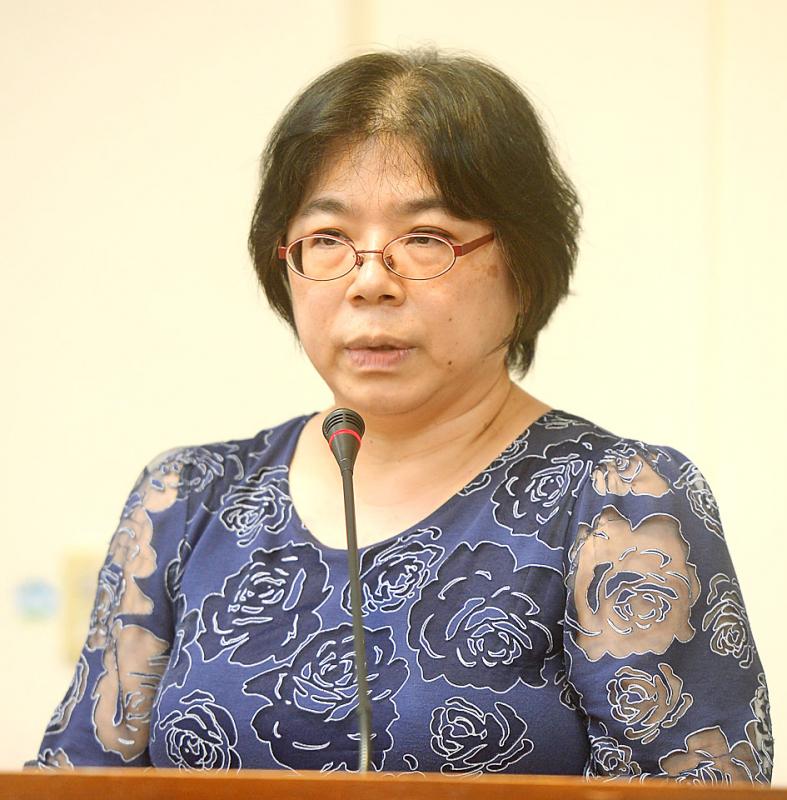The National Development Council (NDC) on Monday unveiled a four-year plan focusing on several goals, including nurturing a digital talent pool.
Other goals would involve improving the nation’s bilingual education and expanding the efforts to hire international talent, the council said.
The measures would be aimed at promoting Taiwan’s competitiveness and ensuring that it plays a critical role in the dynamic restructuring of the global supply chain, it said.

Photo: Lin Cheng-kung, Taipei Times
Lin Chih-mei (林至美), director of the council’s Department of Human Resource Development, said the council would push for amendments to the Act for the Recruitment and Employment of Foreign Professionals (外國專業人才延攬及僱用法) to make it easier for foreign talent to work in Taiwan.
Regarding fostering local digital talent, Lin said that the council would work with other government agencies and experts from various fields to come up with a more concrete definition of what constitutes “digital talent.”
“After all, the digital competencies needed in the cultural sector and in the information and communications industry vary immensely,” she said.
Taiwan faces a shortage of skilled workers, most notably in the fields of science, technology, engineering and mathematics (STEM), the council said.
The percentage of college graduates in STEM fields was about 30 percent last year, Lin said.
“It is really not enough to meet the future need for digital talent,” she said.
Lin said that it was an indication that the government needs to improve its efforts to cultivate digital talent.
Meanwhile, Taiwan would try to establish a “semiconductor academy” this year, Lin said.
She was referring to a plan discussed at a meeting between Vice Premier Shen Jong-chin (沈榮津) and representatives from the semiconductor industry to have the government, academia and industry set up a semiconductor academy.

Taiwan Transport and Storage Corp (TTS, 台灣通運倉儲) yesterday unveiled its first electric tractor unit — manufactured by Volvo Trucks — in a ceremony in Taipei, and said the unit would soon be used to transport cement produced by Taiwan Cement Corp (TCC, 台灣水泥). Both TTS and TCC belong to TCC International Holdings Ltd (台泥國際集團). With the electric tractor unit, the Taipei-based cement firm would become the first in Taiwan to use electric vehicles to transport construction materials. TTS chairman Koo Kung-yi (辜公怡), Volvo Trucks vice president of sales and marketing Johan Selven, TCC president Roman Cheng (程耀輝) and Taikoo Motors Group

Among the rows of vibrators, rubber torsos and leather harnesses at a Chinese sex toys exhibition in Shanghai this weekend, the beginnings of an artificial intelligence (AI)-driven shift in the industry quietly pulsed. China manufactures about 70 percent of the world’s sex toys, most of it the “hardware” on display at the fair — whether that be technicolor tentacled dildos or hyper-realistic personalized silicone dolls. Yet smart toys have been rising in popularity for some time. Many major European and US brands already offer tech-enhanced products that can enable long-distance love, monitor well-being and even bring people one step closer to

RECORD-BREAKING: TSMC’s net profit last quarter beat market expectations by expanding 8.9% and it was the best first-quarter profit in the chipmaker’s history Taiwan Semiconductor Manufacturing Co (TSMC, 台積電), which counts Nvidia Corp as a key customer, yesterday said that artificial intelligence (AI) server chip revenue is set to more than double this year from last year amid rising demand. The chipmaker expects the growth momentum to continue in the next five years with an annual compound growth rate of 50 percent, TSMC chief executive officer C.C. Wei (魏哲家) told investors yesterday. By 2028, AI chips’ contribution to revenue would climb to about 20 percent from a percentage in the low teens, Wei said. “Almost all the AI innovators are working with TSMC to address the

Malaysia’s leader yesterday announced plans to build a massive semiconductor design park, aiming to boost the Southeast Asian nation’s role in the global chip industry. A prominent player in the semiconductor industry for decades, Malaysia accounts for an estimated 13 percent of global back-end manufacturing, according to German tech giant Bosch. Now it wants to go beyond production and emerge as a chip design powerhouse too, Malaysian Prime Minister Anwar Ibrahim said. “I am pleased to announce the largest IC (integrated circuit) Design Park in Southeast Asia, that will house world-class anchor tenants and collaborate with global companies such as Arm [Holdings PLC],”